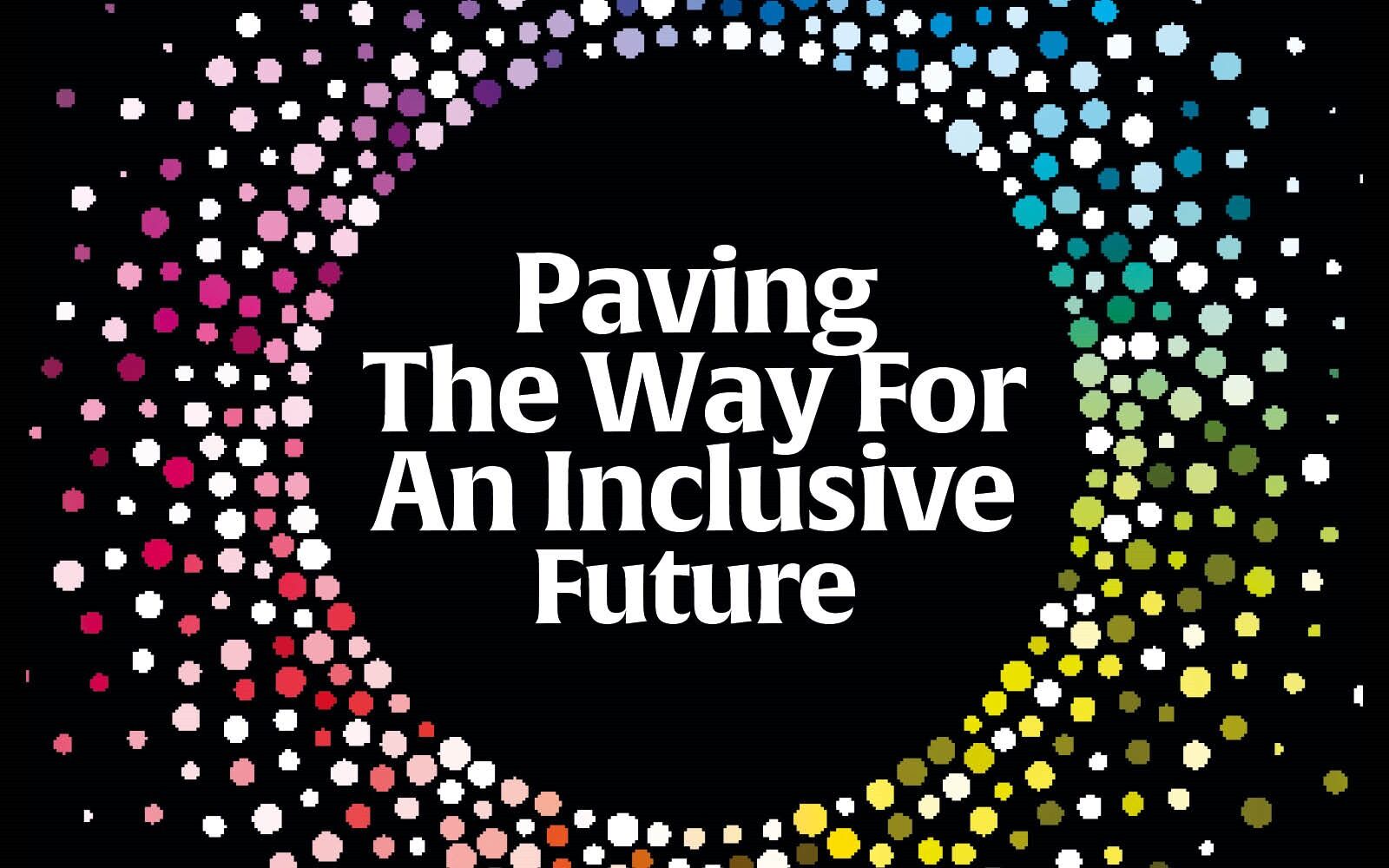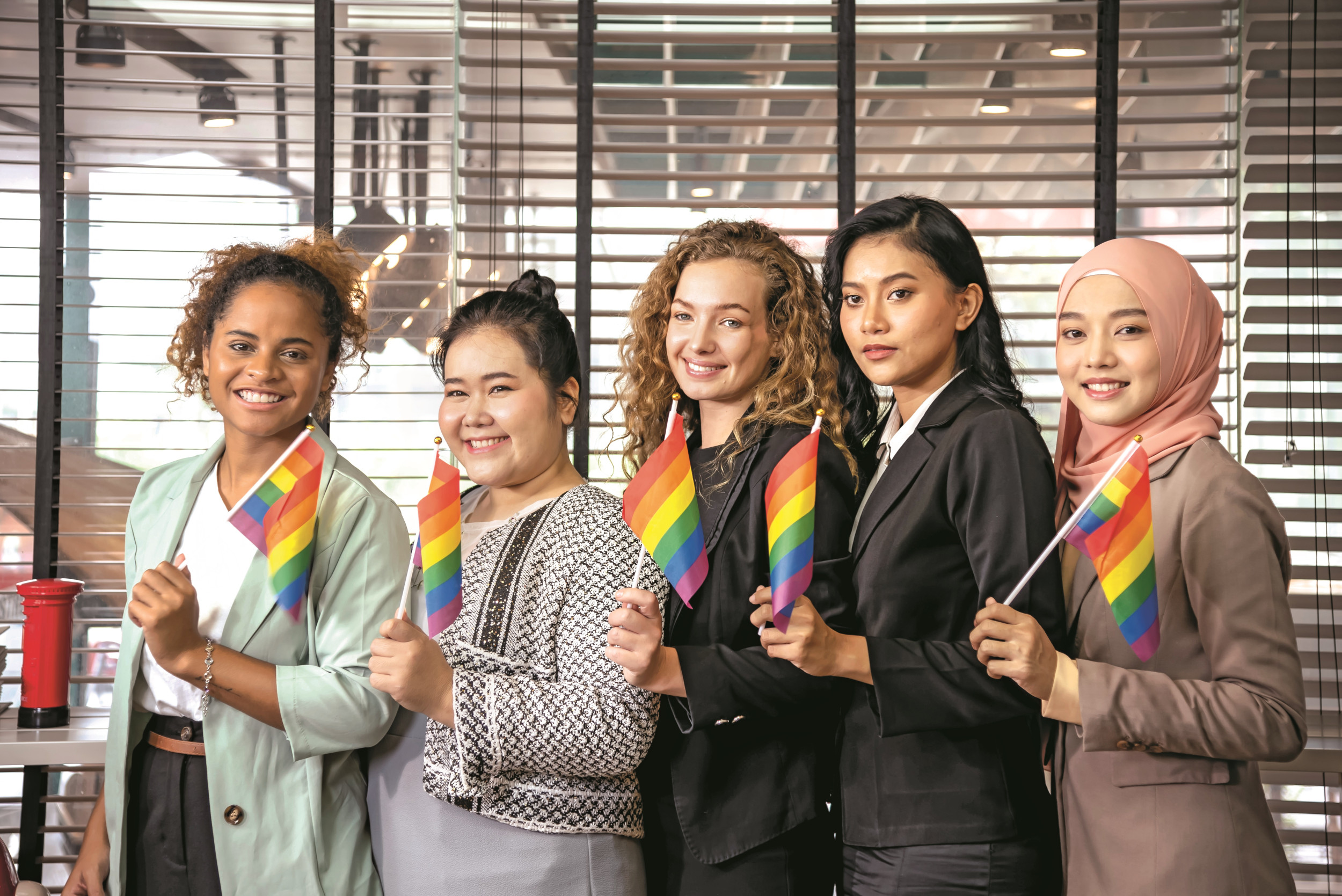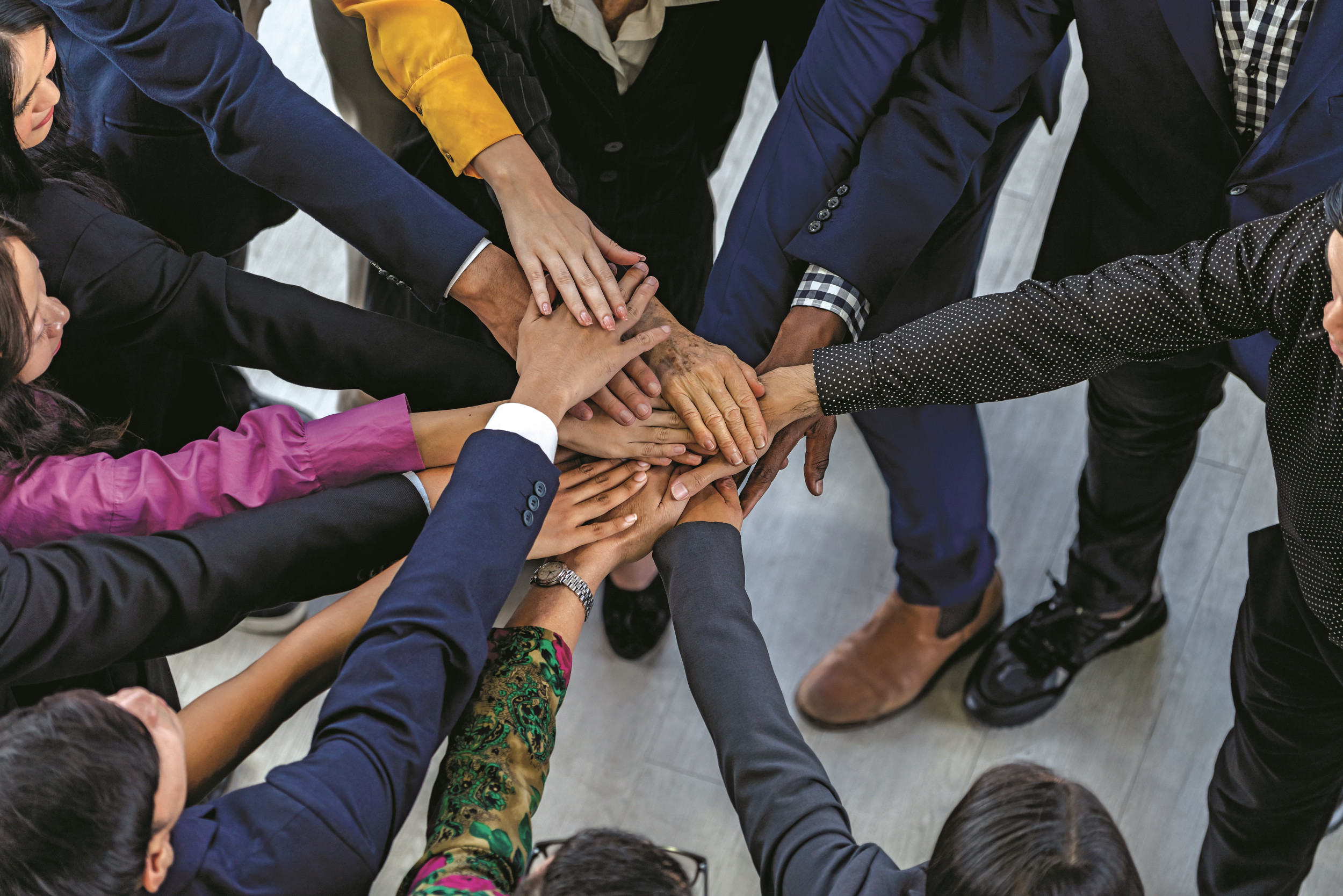
Paving the Way for an Inclusive Future
| In association with |
 |

Inclusivity, diversity, and equity—often interlinked—have been the buzzwords of the past decade. Recognizing the advantages across business and society, companies have intensified their dedication to Diversity, Equity, and Inclusion (DE&I). A January 2023 report forecasts a twofold surge in global spending on DE&I initiatives, reaching $15.4 billion by 2026.
Globalization and technological advancements have cultivated the present-day world, significantly amplifying diversity and inclusion in workplaces and societies. As a result, nations worldwide are swiftly embracing progressive policies, such as affirmative action, equal employment opportunities, anti-discrimination laws, and educational initiatives, that advocate for a society celebrating diversity in gender, race, ethnicity, religion, abilities, and sexual orientation.
Each year, representatives from 100+ countries convene for the World Economic Forum Annual Conference in the picturesque city of Davos, Switzerland. The 54th meeting in mid-January 2024, focused on the 'Rebuilding Trust' theme, is a crucial platform for discussions on trust, transparency, and accountability. Historically, it has drawn notable figures, business leaders, as well as civil society leaders, experts, youth representatives, entrepreneurs, and members of the international press coming from the top ten most represented countries globally.
The World Economic Forum, headquartered in Geneva, Switzerland, has played a pivotal role in engaging political, business, cultural, and other leaders since its establishment in 1971, influencing global, regional, and industry agendas. Advocating for diversity has long been a cornerstone of the Forum's initiatives and has now emerged as one of the most critical global issues worldwide.
Despite much progress toward inclusivity, many challenges still need to be addressed, including communication barriers, entrenched stereotypes and prejudices, diminished trust, legal obstacles, and cultural differences. These roadblocks are often hard to overcome, especially for people from minority groups. However, efforts are underway globally to champion and promote DE&I policies. Tech giants like Salesforce and Microsoft have dedicated programs ensuring product and workplace accessibility for people with disabilities. Nations like Canada emphasize multiculturalism in cities like Toronto and Vancouver, while Stockholm, Sweden, champions LGBTQ+ rights. United Nations' Sustainable Development Goals tackle inequality and initiatives like Girls Who Code aim to bridge gender gaps in tech. Australia's Diversity Council promotes inclusive workplaces. These initiatives represent diverse efforts globally.
Inclusive policies are now pivotal in society and workplaces, impacting job decisions as individuals seek organizations with more robust inclusivity measures. Companies emphasize DE&I policies to affirm their commitment to diversity, secure financial stability, and nurture an inclusive environment. This evolution of diversity promises opportunities for a more inclusive society, particularly. evident in policies aimed at empowering women in the workforce.
Women Leading Change: Architects of Tomorrow
Globally, only 47 percent of women actively participate in the labor force, compared to 72 percent of men. Unfortunately, progress in closing the global gender gap has been slow, with just a 1 percent decrease over the past thirty years. By not tapping into women's potential, many economies are missing out. The International Monetary Fund (IMF) estimates that fully integrating women could increase emerging and developing economies' gross domestic product (GDP) by up to 8 percent in the coming years.
The 2023 Global Gender Gap Report from WEF evaluates 146 countries, measuring gender gap advancements in economic opportunities, education, health, and political leadership. This year, the overall score stands at 68.4 percent, marking a slight increase of 0.3 percent from 2022, and includes an additional country in this edition. When examined regionally, Europe leads in gender parity (76.3 percent). The European Commission's March 2023 campaign challenges gender stereotypes and is part of the European Union's comprehensive five-year gender equality strategy, addressing inequalities through legislative, educational, and economic reforms. Concurrently, local European governments, organizations, and individuals actively contribute to this transformative shift.
Not only governments but also individuals are trying to make a change. Women have achieved remarkable milestones in recent years, witnessing increased representation in leadership and educational progress, amplifying global advocacy for women's rights, and advancing economic empowerment. These success stories underscore the urgency of achieving gender equity.
For example, Kamala Harris's historic Vice Presidency and Dr. Kizzmekia Corbett's pivotal role in developing the COVID-19 vaccine highlight progress in politics and healthcare. Ava DuVernay's impactful projects spotlight social justice, while advocates like Tarana Burke and Malala Yousafzai champion discussions on gender-based violence and girls' education. Ngozi Okonjo-Iweala's appointment as the first female Director-General of the World Trade Organization signifies women's ascent to global leadership. Alongside prominent figures, Angela Merkel and Erna Solberg advocated gender equality policies in governance, and innovators like Dr. Fei-Fei Li and Reshma Saujani bridged the gender gap in STEM fields. These are some of the women changing the world.
However, in Asia and Africa, which scored below 65 percent in the 2023 Global Gender Gap Report, significant gender disparities persist. Women face obstacles like the digital divide, limited access to education and healthcare, economic empowerment challenges, gender-based violence, and underrepresentation in leadership roles. Cultural norms in some countries, like Somalia and Pakistan, hinder women from decision-making roles. Similarly, Niger and Mali prioritize marriage over education for girls, while Nigeria and Bangladesh struggle with restricted technology access for women due to infrastructural gaps and low digital literacy.
Despite women's growing ambitions and desire for workplace flexibility, they remain underrepresented in corporate leadership. Reports consistently highlight the persisting gender disparities: globally, women hold less than 30 percent of senior managerial positions, and a significant gender imbalance persists in STEM (Science, Technology, Engineering, and Mathematics) sectors. Moreover, women face financial disadvantages, often due to maternity leaves impacting their careers, limited opportunities for career advancement, and unequal pay for comparable roles, making them oftentimes less desirable hires. These challenges contribute to a wider economic disparity.

So, why should we prioritize gender diversity and fair representation of women? Women bring boundless potential to foster an inclusive society. Their diverse perspectives fuel innovation, drive economic growth, and boost productivity. Furthermore, their presence promotes social cohesion and uplifts the well-being of our communities. Women serve as empowering role models, challenging systemic biases and advocating against discrimination, leading to crucial legislative measures. Gender equality isn't just about fairness; it's about embracing diverse perspectives and talents, fostering inclusive communities and workplaces, and benefiting everyone.
Breaking Barriers: People with Disabilities
Around 1.3 billion people, approximately 17 percent of the global population, live with disabilities. Yet, there remains a striking need for global awareness and inclusion, as only 4 percent of businesses offer disability-inclusive environments. Beyond moral imperatives, fostering disability inclusivity holds substantial economic potential. Exclusion of individuals with disabilities in some nations leads to GDP losses of up to 7 percent. However, their inclusion in the workforce could yield remarkable benefits: a potential 28 percent revenue increase, a doubling of net income, and 30 percent higher profit margins. But, entrenched stereotypes complicate efforts to bring about change.
The World Economic Forum introduced the "Shaping Future of the New Economy and Society" initiative to address the disability gap. Leveraging the Valuable 500, the world's largest network of CEOs committed to disability inclusion, founded in 2019, this platform aims to propel the inclusion of disabled individuals through influential business leadership. With over 500 private sector corporations engaged, encompassing more than 14.8 million employees across 35 countries, this initiative seeks to set new global benchmarks for disability inclusion and workplace equality.
Globally, significant achievements for people with disabilities have been made. Legislative standards like the Americans with Disabilities Act (ADA) and the United Nations Convention on the Rights of Persons with Disabilities (CRPD) have combated discrimination. In education, Sweden integrates disabled students into schools, while Australia's Disability Standards for Education ensures accommodations. Technological advancements like Japan's robotic exoskeletons aid mobility, and India's Accessible India Campaign improves public accessibility. Countries like the UK and Norway champion workplace inclusion, offering support and advisory services. Globally, advocacy and public awareness campaigns, such as the Kenya Society for the Blind and Disabled People of South Africa, have shifted social perceptions and promoted rights.
Individuals with disabilities worldwide have also made significant impacts. From athletes like Keiichi Kimura and Sae Tsuji at Japan's 2021 Tokyo Paralympic Games to advocates like Li Dan and Nujeen Mustafa challenging societal views, these individuals have broken barriers and changed perceptions. Renowned Swedish composer Ludwig Göransson, born with partial hearing loss, garnered awards for the 'Black Panther' soundtrack. Born without legs, Jen Bricker excelled in gymnastics, showcasing exceptional talent. American Josh Sundquist, a Paralympic ski racer and cancer survivor who lost his leg, is celebrated for his positive attitude and inspirational speeches.
People with disabilities encounter substantial challenges, often being overlooked and denied access to employment opportunities, facing unequal workplace hiring, promotion, and pay standards, with their employment rate only half that of non-disabled individuals. Additionally, they contend with stigma, discrimination, and a heightened susceptibility to poverty. Efforts in countries like the United States through legislative measures such as the Disability Integration Act of 2019 aim to narrow this gap, while Japan's labor ministry has set a target employment rate of 2.7 percent for people with disabilities by 2026. However, implementation and enforcement of these measures often remain lacking.
Closing the disability gap has become more crucial than ever, given that individuals with disabilities constitute the world's most significant minority, comprising 9 percent in developing nations. It begins with offering accessible solutions that foster the establishment of an inclusive society. Integrating people with disabilities into the workforce expands access to talent, stimulates innovation, enhances reputation, and boosts engagement and retention.
Embracing Diversity in the LGBTQ Community
The LGBTQ community remains an area where progress in inclusivity and diversity is lacking, with individuals facing ongoing discrimination. According to the latest S&P study, more companies acknowledge LGBTQ policies, with the United States taking the lead while the Asia-Pacific region lags.
The World Economic Forum (WEF) has significantly prioritized advancing LGBTQ+ inclusivity to strengthen societies and global economies. Within their agenda, the WEF has authored reports, conducted research, facilitated discussions, raised awareness, and offered policy recommendations, urging businesses to embrace Diversity, Equity, and Inclusion (DE&I) policies.

Although the LGBTQ community has achieved notable milestones like increased legal recognition, legalization of same-sex marriage in certain nations, improved representation across sectors, and healthcare advancements, discrimination remains widespread globally. Leading countries in LGBTQ inclusion efforts, such as the Netherlands, Canada, Sweden, Norway, Spain, New Zealand, Uruguay, and Portugal, have legalized same-sex marriage and implemented anti-discrimination laws and protective policies over the last two decades. Governments drive this change, bolstered by organizations and LGBTQ advocacy groups like the American-based Human Rights Campaign and UK-based Stonewall, advocating for equal rights through outreach and education. Individuals are also making a change and increasing the visibility of LGBTQ communities. American TV host Ellen DeGeneres used her platform to bring LGBTQ issues to the mainstream.
However, globally, the LGBTQ community still encounters widespread discrimination, evident in sixty-seven countries criminalizing LGBTQ acts. Societal stigma persists, leading to social exclusion and marginalization. Many nations lack equal legal protections and restrict LGBTQ rights, while health disparities, especially in mental healthcare access continue. Countries like Russia, Saudi Arabia, Iran, and Afghanistan routinely persecute LGBTQ individuals due to cultural, religious, and political factors. The World Economic Forum has served as a platform to address LGBTQ issues and bring them to light.
Recognizing the heightened significance of LGBTQ inclusion, the World Economic Forum underscores its pivotal role in society and the workforce for global economic advancement. The world must thus continue on its path to becoming more accepting of LGBTQ individuals and providing them equal opportunities, both in upholding fundamental human rights and in creating a diverse, discrimination-free society. Legal protections play a critical role in shielding the LGBTQ community from discrimination and violence while embracing acceptance and ensuring equal opportunities is pivotal in creating an all-encompassing society.
Youth Perspectives on Inclusion
Gen Z and Millennials are poised to drive corporate adoption of diversity and inclusivity practices. As significant drivers for our society's future and post-COVID-19 recovery, these generations constitute around 15 percent of the world's population, totaling approximately 1.2 billion people, with an expected increase of 10 billion more by the century's end. This exponential growth, primarily from developing and populous nations, will demand more resources than ever. The young generation is also most affected by the world's political, socio-economic, and environmental crises.
The World Economic Forum's community, Global Shapers, consists of over 14,000 young individuals advocating for the pivotal role of youth in policy-making, solutions, and enduring change. In 2021, the community authored the inaugural "Youth Recovery Plan," involving two million young people from 150 countries to develop 40 policy recommendations on crucial issues, including workplace inclusivity.
Influenced by the internet and social media, Gen Z and Millennials exhibit increasingly inclusive attitudes, challenging norms, advocating for gender equality, accessibility for disabled individuals, and acceptance of the LGBTQ+ community. They will be instrumental in shaping a more inclusive future through advocacy, activism, policy engagement, political involvement, technological advancements, media influence, education, and raising awareness while standing as allies to various minority groups.
Young activists worldwide are making profound strides for inclusivity, justice, and equality. Initiatives like Fridays for Future, led by Greta Thunberg, tackle climate change's impact on equality, while movements like Black Lives Matter demand racial justice In Taiwan, young LGBTQ activists championed same-sex marriage legalization in 2019, while Latin American feminists in Mexico and Argentina fight fiercely for reproductive rights and gender equality. Using technology, India's #Section377 campaign successfully lobbied for the decriminalization of homosexuality in a historic 2018 Supreme Court ruling. These young activists worldwide are already positively impacting our world and will continue to do so in the upcoming years.
One of the reasons why younger generations are increasingly engaged is partly due to education's role in shaping attitudes and fostering inclusivity. Across the globe, education systems aim to instill understanding, acceptance, and respect for diversity. For instance, Canada is including indigenous perspectives in its curriculum, while the US implements anti-bullying initiatives such as the "Safe Schools" program for LGBTQ youth. Similarly, nations like Sweden introduce gender-neutral language in education, and the UK, Australia, and South Africa integrate disability awareness and multicultural education to break stereotypes and promote empathy. Finland focuses on teacher training for inclusive practices, while initiatives like the Council of Europe's HELP program equip educators to build an inclusive society. However, some more conservative regions might still struggle with modifying their school curriculums to make them more progressive.
Education, combined with technological advancements, serves as a catalyst for nurturing inclusivity by instilling values of tolerance and respect for diverse backgrounds. Through comprehensive programs, awareness is fostered regarding diverse cultures, genders, sexual orientations, disabilities, and backgrounds, thereby nurturing empathy and fostering a culture of acceptance.

Looking Forward: The Road to an Inclusive Society
Global commitment to DEI policies steadily increases despite slow progress. While strides were made toward inclusivity, certain countries face challenges obstructing this evolution, necessitating additional collaborative efforts among governments, businesses, and individuals.
Initiating collaboration through dialogue is crucial. Organizations like The World Economic Forum are pivotal in fostering public-private cooperation for an inclusive future, particularly in a post-pandemic world. Achieving an inclusive society relies on joint efforts among businesses, governments, and communities.
As global endeavors toward inclusion continue, the momentum emphasizes the necessity for sustained dialogue and collective action beyond specific events, reinforcing the shared responsibility to value everyone's unique contributions and steer societies toward a more inclusive future. The future of inclusivity can only be achieved if we work together.